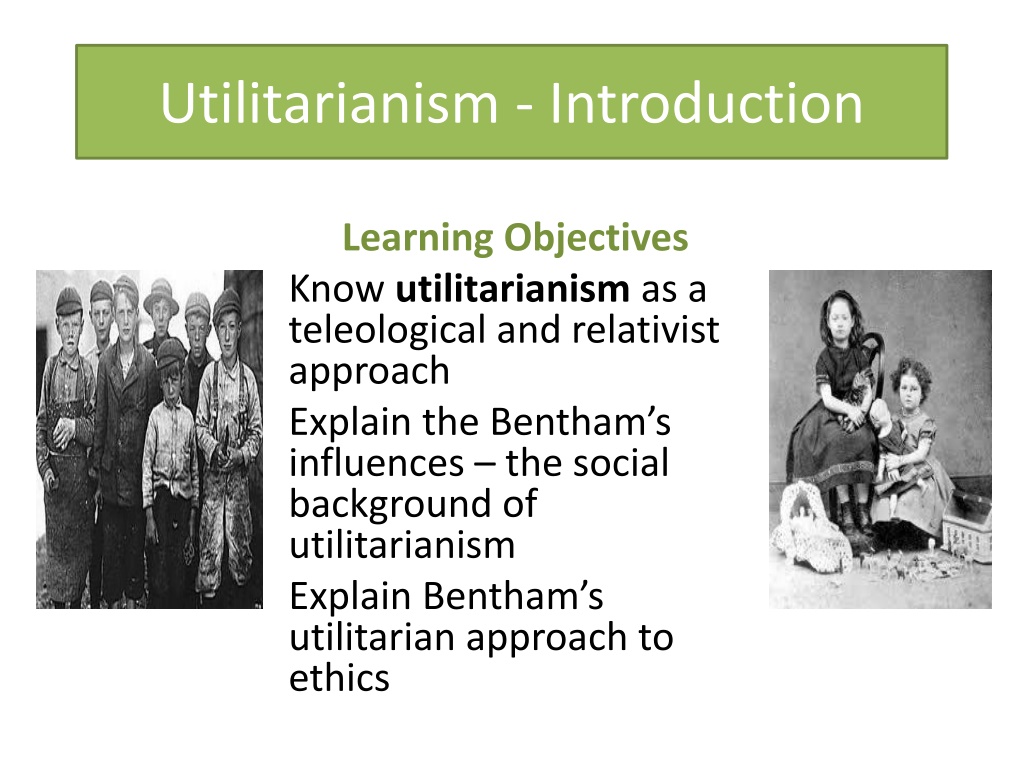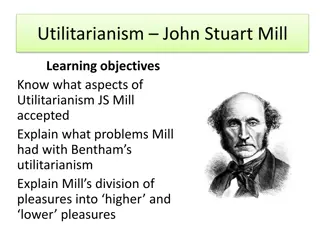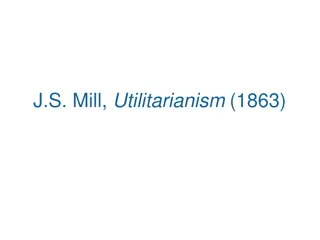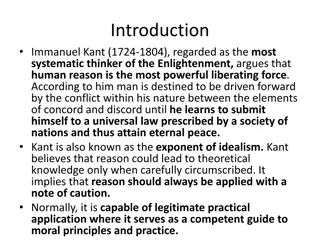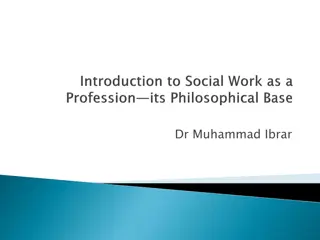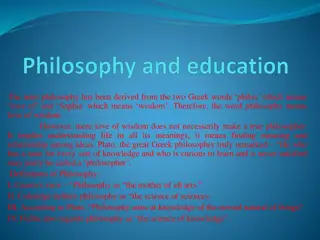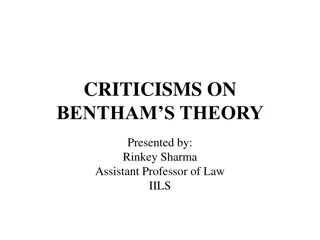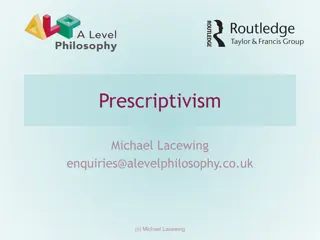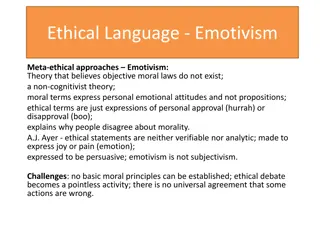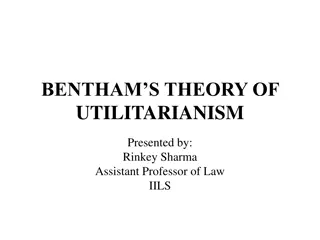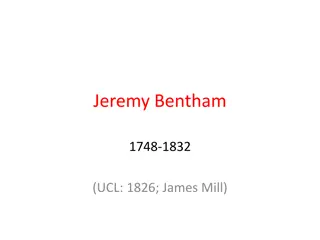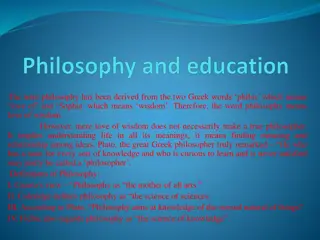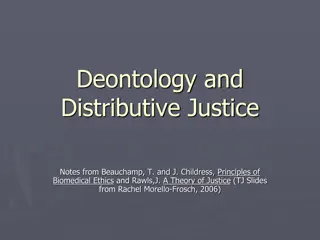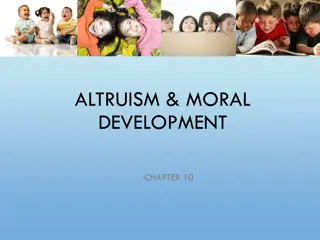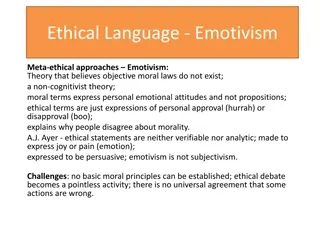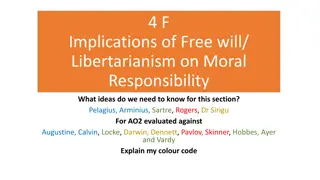Understanding Utilitarianism: Bentham's Moral Philosophy
Utilitarianism, a teleological and relativist ethical theory created by Jeremy Bentham, focuses on maximizing happiness and minimizing pain for the greatest number of individuals. Bentham's Act Utilitarianism emphasizes the principle of utility and uses the hedonic calculus to measure pleasure. This approach to ethics considers consequences and seeks the greatest overall happiness. Explore the ethical implications and practical applications of Utilitarianism in various moral dilemmas.
Download Presentation

Please find below an Image/Link to download the presentation.
The content on the website is provided AS IS for your information and personal use only. It may not be sold, licensed, or shared on other websites without obtaining consent from the author. Download presentation by click this link. If you encounter any issues during the download, it is possible that the publisher has removed the file from their server.
E N D
Presentation Transcript
Utilitarianism - Introduction Learning Objectives Know utilitarianism as a teleological and relativist approach Explain the Bentham s influences the social background of utilitarianism Explain Bentham s utilitarian approach to ethics
The Big Picture Bentham s Act Utilitarianism Specification Content Classical Utilitarianism - Jeremy Bentham s Act Utilitarianism: happiness as the basis of morality: Bentham's theory of 'utility' or 'usefulness'; ultimate aim is to pursue pleasure and avoid pain; principle of utility ('the greatest happiness for the greatest number'). The hedonic calculus as a means of measuring pleasure in each unique moral situation; by considering seven factors: intensity, duration, certainty, remoteness, fecundity, purity and extent. Act Utilitarianism as a form of moral relativism, a consequentialist and teleological theory
https://www.youtube.com/watch?v=H PLPXL5vYrU https://www.youtube.com/watch?v=cNOolslT PQU Philosophy ninja
Starter A police officer accidentally discovers a man in a house with bomb making equipment. The man admits that a bomb has been planted nearby and that it will explode in one hour. The man refuses to tell the police officer where the bomb is. The police officer is on his own and could use force to make the man tell him where the bomb is. The police officer does not use force and goes by the book even though he knows it will take over an hour for the police to arrive and start to question him. Is this teleological or deontological? Why? Would you authorise someone to be tortured to save innocent lives? Write yes/no on your white board which did the majority vote for? Give reasons for your answer
Teleological, Consequentialist and Relative Bentham s Utilitarianism looks at the end purpose or goal of action in order to decide how to behave It claims people should base moral judgements based on the outcome or the consequences of an action There are NO absolute rules which will be the same for all people in all ages and decisions are made relative to the situation.
What is Utilitarianism? Utilitarianism is a ethical theory, developed by Jeremy Bentham and John Stuart Mill who adopted the principle that right actions are those that produce the greatest total happiness/pleasure for everyone affected by their consequences, and wrong actions those that do not.
The principle of utility The word utilitarian comes from the Latin word utilis which means useful. The principle of utility is the guiding principle (or idea) of utilitarianism. It claims when there is a moral choice to be made, then the right action is the one which produces the greatest happiness (or the least pain) for the most people. The greatest good for the greatest number
Universal ethical hedonism Bentham developed universal ethical hedonism. This is the idea that everyone is equal and has an equal right to happiness. If an action brings or increases happiness it is right. Prejudice apart, the game of push-pin is of equal value with the arts and sciences of music and poetry.
Context of the origin of the theory Discuss the features of the lives of the rich and poor in Rich Poor
Christianitys reaction to social issues The rich man in his castle, The poor man at his gate God made them high and lowly, And ordered their estate. All things bright and beautiful, All creatures great and small, All things bright and beautiful, The Lord God made them all
Jeremy Benthams influences Hedonism Rejects aspects of Christianity Social philanthropy/ charity/concern for others Industrial revolution Priestley Enlightenment Read pages 4 - 5 and Vardy 64-65 and complete this diagram in your notes
Benthams Utilitarianism If this is the answer what is the question? 1. Hedonism 2. The greatest good for the greatest number 3. The Hedonic Calculus 4. 7 5. A theory that is concerned with the end purpose or goal of an action
Principles of Morals and Legislation Jeremy Bentham Answer the questions on the question pages in the booklet or in your own notes Pages 6-10
Summary Bentham believed that In Introduction to Principles of Morals and Legislation he stated that it was possible to His
Hedonic Calculus Seven Criteria revision aide Purity Remoteness Richness (fecundity) Intensity Certainty Extent Duration
Questions 1. Which ancient ethical system focused on pleasure 2. What is the principle of utility? 3. What name is given to Bentham s attempt to assess how we should behave? 4. How many factors in the HC? 5. What is a teleological theory?
Q.3 (a) Explain how ethical decisions can be made using Act Utilitarianism What could you add to this answer? Read the sample answer in the revision guide Use it to write up a plan
Q.3 (a) Explain how ethical decisions can be made using Act Utilitarianism Act Utilitarianism: developed by Jeremy Bentham is based on the Principle of Utility (GHP) - Greatest happiness for greatest number (maximum pleasure, minimum pain for greatest number). The hedonic calculus is used to measure the quantity of happiness . The hedonic calculus contains seven criteria - intensity, duration, certainty, extent, remoteness, richness and purity. It puts the happiness/pleasure of others (as consequence of action) at the centre of decision making. Actions are not good or bad in themselves but should be judged according to outcomes or consequences. The theory is also relativistic and teleological. Expect exemplification as outlined in the level descriptors for higher level responses. [AO1 30]
